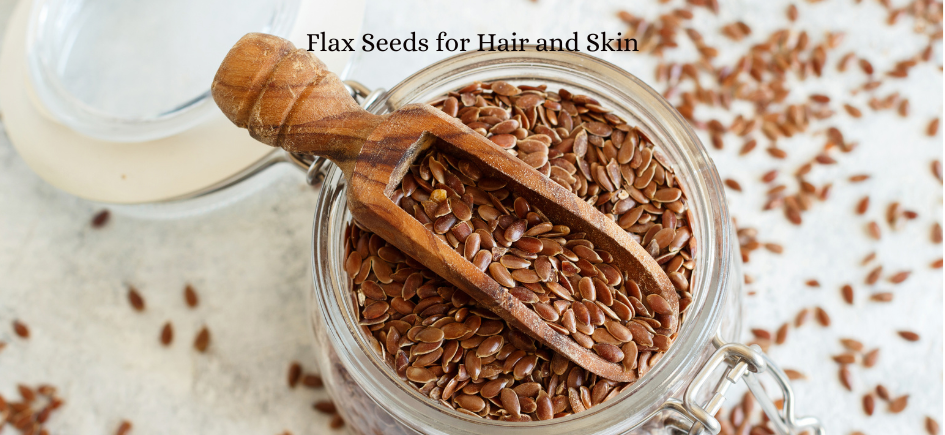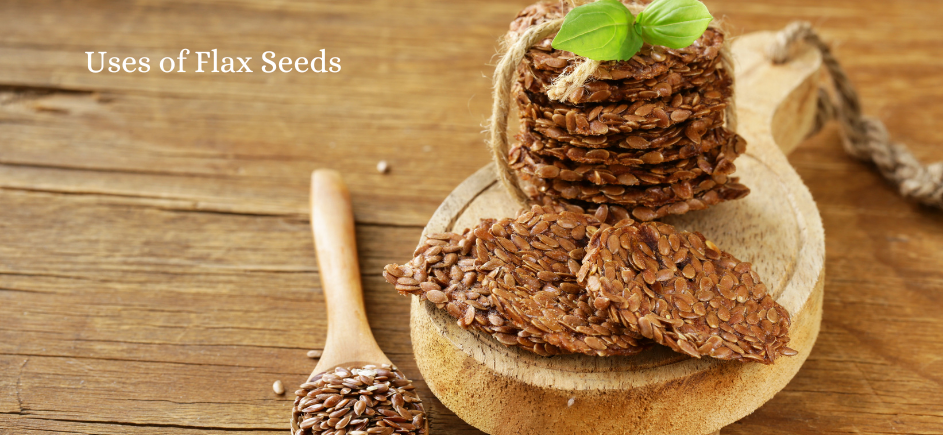The flax plant, Linum usitatissimum, is the source of flax seeds, commonly referred to as linseeds, which are tiny, oil-rich seeds that have been farmed for thousands of years for various purposes. These small seeds are valued for their nutritional content and many medical, food, and industrial uses.
Flax seeds are a nutritional powerhouse because they contain many omega-3 fatty acids, especially alpha-linolenic acid (ALA), essential for reducing inflammation and maintaining heart health. Additionally, they include a lot of soluble and insoluble dietary fibre, which supports gut health and facilitates digestion. Furthermore, lignans, which have antioxidant qualities and may help lower the risk of some tumours like breast and prostate cancer, are rich in flax seeds.
Flax Seeds for Hair and Skin are highly valued in food preparation due to their crisp texture and nutty flavour. Providing fibre and excellent fats can be finely ground and added to baked items such as bread, muffins, and pancakes, improving their nutritional profile. Whole flax seeds can be added to increase the nutritious value of salads, yogurt, or muesli.

Amazing Health Benefits of Flax Seeds
They are a common addition to many diets due to their well-known range of health benefits of flax seeds. Among the main health advantages of eating V-pure flax seeds are the following:
1. Rich in Omega-3 Fatty Acids
Alpha-linolenic acid (ALA), an omega-3 fatty acid, is high in flax seeds, one of the highest amounts of ALA in plant sources. ALA is essential for heart health, inflammation reduction, and brain function support.
2. High in Fibre
Soluble and insoluble fibre can be found in excess in flax seeds. Soluble fibre helps regulate blood sugar levels and cholesterol, while insoluble fibre supports digestive health by promoting regular bowel movements and preventing constipation.
3. Antioxidant Properties
Flax seeds contain lignans, plant compounds with antioxidant properties. These lignans help neutralize harmful free radicals in the body, reducing oxidative stress and lowering the risk of chronic diseases such as cancer and heart disease.
4. Heart Health
The omega-3 fatty acids and fibre found in flax seeds contribute to heart health by reducing inflammation, lowering blood pressure, and improving cholesterol levels. Regular consumption of flax seeds has been associated with a decreased risk of heart disease and stroke.
5. Weight control
Flax seeds' high fibre content can promote a feeling of fullness and reduce hunger, which may help with weight management and protect against overeating.
6. Blood Sugar Control
Flax seeds can potentially lower blood sugar, especially in people with diabetes. Flax seeds' soluble fibre reduces the rate at which sugar enters the body, thus avoiding post-meal rises in blood sugar.
7. Digestive Health
The combination of soluble and insoluble fibre in flax seeds promotes digestive health by regulating bowel movements, preventing constipation, and supporting the growth of beneficial gut bacteria.
8. Joint Health
Research indicates that the anti-inflammatory properties of flax seeds may help reduce pain and discomfort related to inflammatory diseases, including osteoarthritis and rheumatoid arthritis.
Including flax seeds in your diet is easy by mixing them into baked goods, cereal, yogurt and smoothies. For all of the nutritional benefits of flax seeds, they must be consumed ground or milled; otherwise, the roots may pass through the digestive system unprocessed. It's essential to speak with a healthcare provider before making any dietary changes, particularly if you have underlying health issues or are on medication.

Nutrition Value for Benefits of Flax Seeds
1. Calories
Flax seeds are relatively calorie-dense, providing about 150 calories per ounce.
2. Macronutrients
Fat: The benefits of flax seeds are rich in healthy fats, with approximately 12 grams of fat per serving. Most fat content consists of polyunsaturated fats, including omega-3 fatty acids (ALA) and omega-6 fatty acids (linoleic acid).
Protein - Flax seeds are a good source of plant-based protein, containing around 5 grams per serving. Protein is essential for muscle repair, growth, and overall body function.
Carbohydrates - Benefits of flax seeds are relatively low in carbohydrates, with about 8 grams per serving. The majority of these carbohydrates come from dietary fibre rather than sugars.
3. Dietary Fibre
With about 7-8 grammes of dietary fibre per serving, flax seeds' benefits are extremely fibre-rich. Both soluble and insoluble fibre, which help healthy digestion, promote regular bowel movements and help regulate blood sugar, form this amount of fibre.
4. Vitamins
While flax seeds are not particularly rich in vitamins, they contain small amounts of vitamin B1 (thiamine) and vitamin B6, which are essential for energy metabolism and nervous system function.
So why wait? Buy flax seeds from V-pure in the best quality and quantity and take the benefits of flax seeds. They also offer some other types of Indian spices online. Check out our quality from reviews and our latest offer.

Simple Ways to Consume for Benefits of Flax Seeds
You can enjoy the nutritional advantages of flax seeds in your diet in several ways.How to consume flax seeds in the following ways.
1. Ground Flax Seeds
Grinding flax seeds makes their nutrients more accessible to your body. You can grind them using a coffee grinder or a food processor. Once ground, sprinkle them over yogurt, cereal, oatmeal, or salads.
2.
Flaxseed Oil
Flaxseed oil is another way to enjoy the benefits of flax seeds. It has a delicate, nutty flavour and can be used as a salad dressing or added to smoothies. However, it's important to note that flaxseed oil does not contain fibre, so it doesn't offer the same digestive benefits as whole or ground flax seeds.
3. Flaxseed Gel
Grinded flaxseed and water can be combined to form an essential flaxseed gel. This gel can be used in soups, sauces, and smoothies as a thickener or in place of eggs in vegetarian cooking recipes.
4. Flaxseed Meal
Ground flax seeds compose a flaxseed meal. It is easily found in stores and can be used instead of flour in recipes for desserts, pancakes, and waffles. Your favourite recipes will taste better and be more nutritious with the addition of a flaxseed meal.
5. Whole Flax Seeds
You can still eat whole flax seeds, even though crushed flax seeds are more accessible to the stomach. They offer a crispy texture and nutty flavour to baked items like bread, biscuits, and muffins. Additionally, you may add whole spices online India to stir-fries, stews, and soups.
 In conclusion, flax seeds are tiny nutritional powerhouses with a wide range of health benefits of flax seeds and adaptable uses. Including Uses of flax seeds in your diet, whether whole, crushed, or as oil, can be an easy yet powerful method to improve your general health and well-being.
In conclusion, flax seeds are tiny nutritional powerhouses with a wide range of health benefits of flax seeds and adaptable uses. Including Uses of flax seeds in your diet, whether whole, crushed, or as oil, can be an easy yet powerful method to improve your general health and well-being.



 In conclusion, flax seeds are tiny nutritional powerhouses with a wide range of health benefits of flax seeds and adaptable uses. Including Uses of flax seeds in your diet, whether whole, crushed, or as oil, can be an easy yet powerful method to improve your general health and well-being.
In conclusion, flax seeds are tiny nutritional powerhouses with a wide range of health benefits of flax seeds and adaptable uses. Including Uses of flax seeds in your diet, whether whole, crushed, or as oil, can be an easy yet powerful method to improve your general health and well-being.